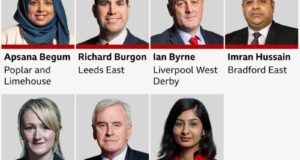
Jeremy Corbyn has urged the leaders of the other opposition parties and Tory rebels to install him as caretaker PM in order to stop a no-deal Brexit.
If he wins a no-confidence vote in the government, the Labour leader plans to delay Brexit, call a snap election and campaign for another referendum.
But Liberal Democrat leader Jo Swinson said she would not support making Mr Corbyn prime minister.
She called him “divisive” and said he would not command MPs’ support.
In speech on Thursday, she said her party would work with others to stop a no-deal exit but Mr Corbyn was not a leader “respected on both sides of the House”.
Instead, she suggested Tory MP Ken Clarke or Labour’s Harriet Harman could lead an emergency government to prevent a no-deal on the 31 October deadline.
She added that MPs should “stand and be counted” and try to pass legislation in Parliament to ensure the UK does not leave without an agreement with the EU.
Downing Street said Mr Corbyn would “overrule the referendum and wreck the economy” if he became prime minister.
A No 10 spokesman said: “This government believes the people are the masters and votes should be respected.
“Jeremy Corbyn believes that the people are the servants and politicians can cancel public votes they don’t like.”
Mr Corbyn asked opposition figures and Tory rebels for their support in a letter on Wednesday, pledging that a government led by him would be “strictly time-limited”.
He said he would call a no-confidence vote – which would require majority support – at the “earliest opportunity when we can be confident of success”.
If he were to succeed in calling a general election – which would require the support of two-thirds of MPs – Labour would campaign for a second referendum with the option to remain in the EU, he said.
Prime Minister Boris Johnson said he wants a deal with the European Union, but insists the UK must leave the bloc by the end of October “do or die”.
Green MP Caroline Lucas welcomed Mr Corbyn’s call for a vote of no confidence but insisted a referendum must be held before any general election
Plaid Cymru’s Westminster Leader Liz Saville Roberts said she welcomed any attempt to stop no-deal but said it was “disappointing” that he would not commit to calling a referendum before an election
The SNP’s Westminster leader Ian Blackford said his party would support the principle of a no-confidence vote, but “there is no mechanism for a caretaker government at the moment”
Also receiving the letter were Tory MPs Dominic Grieve, Sir Oliver Letwin and Dame Caroline Spelman, and Nick Boles, the independent MP who quit the Tory Party over Brexit.
Responding on Thursday, they said they were happy to support cross-party work to block no deal and meet Mr Corbyn and MPs from other parties in the coming weeks.
Change UK leader Anna Soubry, who was not sent the letter, said Mr Corbyn “doesn’t even command respect and support from his own party never mind across the political divide”.
BBC political correspondent Tom Barton said the initial response from the other parties suggests Mr Corbyn probably doesn’t have the numbers to get his plan through.
“There are plenty of MPs who say they want to stop a no-deal Brexit but getting them to agree on how to do it – that’s a different matter altogether,” he says.
Shadow education secretary Angela Rayner criticised Ms Swinson for saying she wouldn’t support a Corbyn-led government, accusing her of “political point-scoring”.
“Our leader is Jeremy Corbyn and she should respect his title as the official opposition”, she tweeted.
“When you’re looking at no-deal Brexit and our country in peril, to say ‘I’m not working with him because I don’t like him’ is a very childish thing to do”.
It comes after the prime minister accused MPs “who think they can block Brexit” of a “terrible collaboration” with the EU.
Mr Johnson said the EU had become less willing to compromise on a new deal with the UK because of the opposition to leaving in Parliament.
He said this increased the likelihood of the UK being “forced to leave with a no-deal” in October.
Mr Johnson wants the EU to ditch the Irish border backstop plan from his predecessor Theresa May’s deal, which was rejected three times by Parliament.
But the EU has continued to insist the policy – intended to guarantee there will not be a hard border on the island of Ireland – must remain and cannot be changed.
If the government loses a no-confidence motion, it would trigger a critical 14-day period, after which a general election could be triggered.
If Mr Johnson failed to win such a vote, then a general election would be called.
There are no firm rules about who else, if anyone, should get the chance to form an alternative government during this time.
The leader of the opposition is clearly a likely candidate, but that is not an inevitable outcome.
The Cabinet Manual – a document which sets out the main rules covering the working of government – suggests that the principles applied should be similar to those after an election in which no one party wins a majority.
That means that the old prime minister should only resign if and when it’s clear that somebody is more likely to have the support of MPs.
So it’s possible that the existing prime minister would stay in place, or that more than one leader would get a chance.
Mr Johnson has a working majority of just one in the House of Commons, with the backing of Northern Ireland’s Democratic Unionist Party.
 Weekly Bangla Mirror | Bangla Mirror, Bangladeshi news in UK, bangla mirror news
Weekly Bangla Mirror | Bangla Mirror, Bangladeshi news in UK, bangla mirror news







